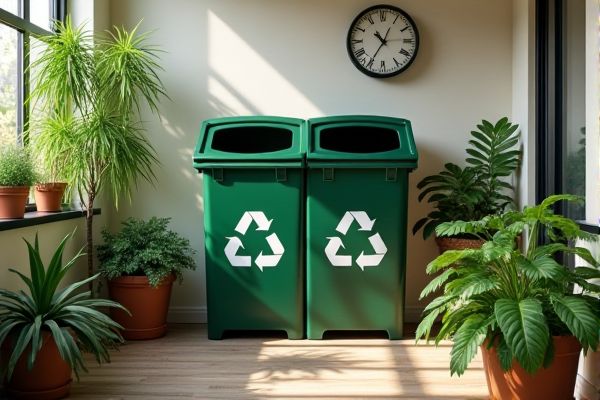
A recycle center is a facility where materials like paper, plastic, and metal are processed for reuse, reducing landfill waste and conserving resources, while a compost bin transforms organic waste such as food scraps and garden clippings into nutrient-rich soil for gardening. Understanding the differences and benefits of each system will help you make the best environmental choice; explore the rest of the article to learn more.
Table of Comparison
| Feature | Recycle Center | Compost Bin |
|---|---|---|
| Purpose | Process recyclable materials like paper, plastic, glass, and metal | Convert organic waste into nutrient-rich compost |
| Accepted Materials | Paper, cardboard, plastics (#1-7), glass, metals | Food scraps, yard waste, coffee grounds, eggshells |
| Environmental Impact | Reduces landfill waste, conserves resources, lowers carbon footprint | Reduces organic waste, improves soil health, reduces methane emissions |
| Processing Time | Varies by material, usually days to weeks | Typically 2-6 months for full decomposition |
| Location | Centralized facilities or local drop-off points | At home or community gardens |
| Cost | Usually free or low-cost service | Initial bin purchase; minimal ongoing cost |
Introduction to Recycling Centers and Compost Bins
Recycling centers are dedicated facilities that process and sort recyclable materials such as paper, plastics, metals, and glass to reduce landfill waste and promote environmental sustainability. Compost bins, on the other hand, are containers or designated areas where organic waste like food scraps and yard debris decompose naturally, creating nutrient-rich compost for soil enrichment. Understanding the distinct roles of recycling centers and compost bins helps you manage household waste more effectively and support eco-friendly practices.
Key Differences Between Recycling and Composting
Recycling centers process materials like paper, plastic, glass, and metals to convert waste into reusable raw materials, reducing landfill use and conserving natural resources. Compost bins break down organic waste such as food scraps and yard waste into nutrient-rich soil amendments, enhancing soil health and promoting sustainable gardening. Recycling focuses on reclaiming synthetic materials, while composting targets biodegradable waste, making each essential for effective waste management and environmental sustainability.
How Recycling Centers Work
Recycling centers function by collecting, sorting, and processing recyclable materials such as paper, plastics, glass, and metals to prepare them for manufacturing new products. Advanced machinery and manual labor separate contaminants and ensure materials meet quality standards for resale to factories. This system reduces landfill waste, conserves natural resources, and lowers greenhouse gas emissions by feeding recyclable materials back into the production cycle.
How Compost Bins Operate
Compost bins operate by breaking down organic waste such as fruit and vegetable scraps, coffee grounds, and yard trimmings through aerobic decomposition facilitated by microorganisms, heat, and moisture. The process converts biodegradable materials into nutrient-rich compost that improves soil health and reduces landfill waste. Unlike recycle centers that process inorganic materials like plastics and metals, compost bins focus specifically on managing organic waste for environmental sustainability.
Types of Materials Accepted: Recycling vs Composting
Recycling centers accept materials such as paper, plastics, metals, and glass, which are processed and transformed into new products to reduce landfill waste. Compost bins handle organic waste like food scraps, yard trimmings, and biodegradable materials, converting them into nutrient-rich soil amendments through natural decomposition. Understanding the distinct types of materials accepted by each system helps you manage waste effectively, promoting environmental sustainability.
Environmental Impact: Recycling Centers vs Compost Bins
Recycle centers reduce landfill waste by processing materials like plastics, glass, and metals, conserving natural resources and lowering greenhouse gas emissions. Compost bins transform organic waste into nutrient-rich soil amendments, enhancing soil health and reducing methane emissions from decomposing food scraps. Your choice between these options directly influences waste diversion and environmental sustainability efforts.
Convenience and Accessibility
Recycle centers provide centralized locations designed for handling large volumes of recyclable materials, often offering extended hours and specialized drop-off options. Compost bins, placed directly in Your home or garden, allow for immediate disposal of organic waste, promoting convenience by reducing trips to external sites. Choosing between the two depends on your accessibility to recycling facilities and the volume of compostable material generated.
Costs and Maintenance Requirements
Recycle centers typically involve lower direct costs for users, as many municipalities offer free drop-off services, but transportation and sorting can require more time and effort. Compost bins demand an initial investment ranging from $50 to $300, with ongoing maintenance such as regular aeration and moisture control essential to prevent odors and pests. Your choice depends on whether you prefer minimal upkeep with possible travel or hands-on management for organic waste reduction.
Which Option Fits Your Household Best?
Choosing between a recycle center and a compost bin depends on Your household's waste habits and environmental goals. Recycle centers efficiently handle materials like paper, plastics, and metals, reducing landfill impact for homes generating significant recyclable waste. Compost bins suit households with ample organic kitchen scraps and yard waste, turning food and plant matter into nutrient-rich soil for gardening use.
Choosing Sustainable Waste Management Solutions
Choosing sustainable waste management solutions involves understanding the key differences between a recycle center and a compost bin. A recycle center processes materials like plastics, metals, and paper for reuse in manufacturing, significantly reducing landfill waste and conserving natural resources. Your decision can prioritize compost bins for organic waste, which decompose into nutrient-rich soil amendments, supporting soil health and minimizing greenhouse gas emissions.
 homyna.com
homyna.com